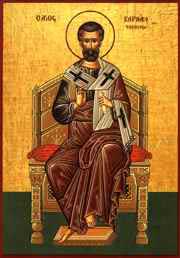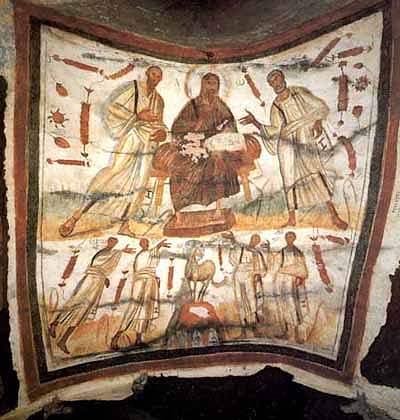In the daily readings of the Rule of St Benedict as traditionally organised, we have now reached the chapters relating to the Office (viz Chapter 8) which are worth reading, particularly if you are relatively new to the Office, haven't done so before, or haven't read them for a while.
The Rule on the Office
These chapters of the Rule often appear a bit dry, but with a bit of digging they can actually yield a lot in my view. In particular, they assume a knowledge of Patristic and monastic traditions. Accordingly this time through the Rule over at my Daily Readings from the Rule Blog I'm providing some extracts from key source texts from before St Benedict's time that I think throw some light on his thinking.
The first post in the series deals with the connection between the first seven chapters of the Rule which set out St Benedict's spiritual theology and the Office, the reasons for praying at night, and the instruction to study the psalms between Matins and Lauds.
St Augustine on prayer through Christ
By way of a taster, on the last point I've included a discussion of prayer in the context of the psalms by St Augustine, who provides a deeply Christological interpretation of prayer which is entirely consistent with St Benedict's approach.
St Benedict starts his Rule with a discussion of the virtues of cenobitic monasticism, where a group of people are made one through God under the abbot. And the pre-eminent work of this one body is of course the Office, on which St Benedict instructs: 'let nothing be put before the Work of God', a phrase which Fr Cassian Folsom has pointed out in an excellent series of Conferences can be interpreted as 'put nothing before Christ' (drawing on similar phrases in chapters 43, 4 and 72 of the Rule).
St Augustine summarises and makes clear these linkages saying:
The Rule on the Office
These chapters of the Rule often appear a bit dry, but with a bit of digging they can actually yield a lot in my view. In particular, they assume a knowledge of Patristic and monastic traditions. Accordingly this time through the Rule over at my Daily Readings from the Rule Blog I'm providing some extracts from key source texts from before St Benedict's time that I think throw some light on his thinking.
The first post in the series deals with the connection between the first seven chapters of the Rule which set out St Benedict's spiritual theology and the Office, the reasons for praying at night, and the instruction to study the psalms between Matins and Lauds.
St Augustine on prayer through Christ
By way of a taster, on the last point I've included a discussion of prayer in the context of the psalms by St Augustine, who provides a deeply Christological interpretation of prayer which is entirely consistent with St Benedict's approach.
St Benedict starts his Rule with a discussion of the virtues of cenobitic monasticism, where a group of people are made one through God under the abbot. And the pre-eminent work of this one body is of course the Office, on which St Benedict instructs: 'let nothing be put before the Work of God', a phrase which Fr Cassian Folsom has pointed out in an excellent series of Conferences can be interpreted as 'put nothing before Christ' (drawing on similar phrases in chapters 43, 4 and 72 of the Rule).
St Augustine summarises and makes clear these linkages saying:
No greater gift could God have given to men than in making His Word, by which He created all things, their Head, and joining them to Him as His members: that the Son of God might become also the Son of man, one God with the Father, one Man with men; so that when we speak to God in prayer for mercy, we do not separate the Son from Him; and when the Body of the Son prays, it separates not its Head from itself: and it is one Saviour of His Body, our Lord Jesus Christ, the Son of God, who both prays for us, and prays in us, and is prayed to by us. He prays for us, as our Priest; He prays in us, as our Head; He is prayed to by us, as our God. Let us therefore recognise in Him our words, and His words in us...
Therefore we pray to Him, through Him, in Him; and we speak with Him, and He speaks with us; we speak in Him, He speaks in us the prayer of this Psalm, which is entitled, A Prayer of David. For our Lord was, according to the flesh, the son of David; but according to His divine nature, the Lord of David, and his Maker....Let no one then, when he hears these words, say, Christ speaks not; nor again say, I speak not; nay rather, if he own himself to be in the Body of Christ, let him say both, Christ speaks, and I speak. Be thou unwilling to say anything without Him, and He says nothing without you....There are a lot of passages like this that I think help us understand what St Benedict is coming from on the Office, and can deepen our understanding of it, so I do hope you will go over and take a look at the contextual texts I've assembled.


